Elderberries, derived from the elder tree (Sambucus), have been used for centuries in traditional medicine for their health-boosting properties. These small, dark purple berries are rich in nutrients and have become a popular natural remedy in modern wellness circles. Whether in syrup form, teas, or supplements, elderberries offer a range of health benefits, making them a superfood worth incorporating into your diet.
 Boosts Immune System
Boosts Immune System
Elderberries are packed with antioxidants and vitamins, especially vitamin C and A, which are known to enhance the immune system. Their high concentration of flavonoids, particularly anthocyanins, helps protect cells from oxidative stress and supports the body’s defense against infections. Elderberry syrup is often used as a natural remedy to reduce the severity and duration of colds and flu.
Elderberries are not only rich in common immune-boosting vitamins but also contain unique bioactive compounds that set them apart from other plants. One of the key components responsible for their potent immune-boosting effects is the presence of anthocyanins, a group of flavonoids that give elderberries their deep purple color. These anthocyanins have powerful anti-inflammatory and antiviral properties, which may help inhibit the replication of viruses, particularly those responsible for respiratory infections like the flu. Studies have shown that elderberry extract can reduce the viral load and prevent the virus from spreading, helping the body fight off illness more efficiently.
Additionally, elderberries are high in polyphenols, another group of antioxidants known for their immune-modulating effects. Unlike other fruits, elderberries have an exceptionally high polyphenol content, which helps regulate the immune system’s response, reducing excessive inflammation while enhancing the body’s natural defenses. These polyphenols, particularly quercetin and kaempferol, act as immunomodulators, supporting a balanced immune response and reducing the risk of immune system overactivation, which can lead to autoimmune flare-ups or prolonged inflammation.
What truly sets elderberries apart is their antiviral potential. They contain compounds like lectins and rutin, which have been shown to inhibit the ability of viruses to penetrate and infect host cells. This unique antiviral activity, combined with their ability to stimulate cytokine production, makes elderberries particularly effective in boosting the immune response and preventing viral infections, making them an excellent choice for natural immune support.
 Rich in Antioxidants
Rich in Antioxidants
One of the most impressive properties of elderberries is their antioxidant content. Antioxidants neutralize free radicals, which are harmful molecules that can cause oxidative damage to cells and contribute to chronic diseases such as heart disease and cancer. Consuming elderberries regularly can help combat inflammation and support overall cellular health.
Elderberries are particularly rich in anthocyanins, a type of flavonoid responsible for their deep purple color. These anthocyanins are potent antioxidants, significantly more effective than many other antioxidants found in fruits and vegetables. Studies have shown that the anthocyanins in elderberries can reduce oxidative stress and inflammation more effectively than antioxidants like vitamin C or E, highlighting elderberries as a superior source of protective compounds. This unique profile not only contributes to the fruit’s health benefits but also makes it a valuable addition to a balanced diet focused on disease prevention.
In addition to anthocyanins, elderberries contain other phenolic compounds, including quercetin and kaempferol, which further enhance their antioxidant properties. Quercetin, in particular, has been studied for its anti-inflammatory effects and ability to inhibit the growth of cancer cells. These compounds work synergistically to provide a robust defense against oxidative damage, making elderberries a potent ally for maintaining cellular integrity and overall health.
 Supports Heart Health
Supports Heart Health
Elderberries have been shown to improve cardiovascular health by promoting better circulation and reducing cholesterol levels. The berries’ anthocyanins can help lower LDL cholesterol (the “bad” cholesterol) and improve overall lipid profiles. They also have anti-inflammatory properties that may protect the heart from damage caused by high blood pressure and other cardiovascular conditions.
In addition to anthocyanins, elderberries are rich in flavonoids, which contribute to their heart-healthy benefits. Flavonoids are known for their ability to enhance blood vessel function, improve endothelial health, and reduce arterial stiffness. These compounds work synergistically with anthocyanins to combat oxidative stress, which can lead to inflammation and cardiovascular diseases.
Moreover, elderberries are a natural source of vitamins C and E, both of which play crucial roles in maintaining heart health. Vitamin C helps to strengthen blood vessels and improve iron absorption, while vitamin E acts as a powerful antioxidant, protecting the heart from damage caused by free radicals. This dual action of vitamins C and E enhances the protective effects of elderberries, making them a valuable addition to a heart-healthy diet. Furthermore, the high fiber content in elderberries aids in digestion and helps regulate blood sugar levels, which are critical factors in preventing heart disease.
 Anti-inflammatory and Anti-viral Properties
Anti-inflammatory and Anti-viral Properties
Elderberries are known for their anti-inflammatory and antiviral effects. They have been traditionally used to treat respiratory issues, including bronchitis and sinus infections. Studies suggest that elderberry extract can inhibit the growth of certain viruses, including the flu virus, making it a popular remedy during cold and flu season.
These anthocyanins have been shown to modulate the immune response, reducing inflammation in the body. Unlike some other natural remedies that may only offer mild relief, the potent compounds found in elderberries can directly impact cytokine production, helping to regulate the inflammatory process during viral infections.
Moreover, elderberry’s unique profile of phytochemicals enhances its effectiveness in combating respiratory viruses. Research indicates that elderberry extract can block the entry of viruses into healthy cells, effectively preventing infection. This action is attributed to its ability to bind to viral proteins, thus inhibiting their replication and spread within the body. While many plants offer general immune support, elderberries stand out due to this dual action of both reducing inflammation and blocking viral activity, making them a formidable ally in promoting respiratory health during the colder months.
 Aids Digestion
Aids Digestion
Rich in dietary fiber, elderberries help maintain a healthy digestive system. Fiber promotes regular bowel movements, prevents constipation, and supports gut health by nourishing beneficial bacteria in the digestive tract. This makes elderberries not only good for digestion but also beneficial for overall gut health.
What sets elderberries apart from other fiber-rich foods is their unique composition of phenolic compounds and antioxidants, which can further enhance digestive health. These compounds help reduce inflammation in the gut, promoting a balanced intestinal environment. Inflammation is often linked to digestive disorders, so the anti-inflammatory properties of elderberries can be particularly valuable for individuals with conditions such as irritable bowel syndrome (IBS) or inflammatory bowel disease (IBD). By soothing the gut lining, elderberries may help alleviate symptoms like bloating, cramping, and discomfort.
Additionally, elderberries contain certain prebiotic fibers that specifically nourish beneficial gut bacteria. Prebiotics are non-digestible food components that stimulate the growth of healthy microbes in the gut, enhancing the body’s ability to digest food effectively. By acting as a food source for probiotics, elderberries contribute to a thriving gut microbiome, which is crucial for optimal digestion and overall health.
Moreover, elderberries have been traditionally used in herbal remedies to soothe digestive issues. Their natural anti-viral and anti-bacterial properties can help combat gut pathogens, potentially reducing the risk of gastrointestinal infections. This dual action of promoting beneficial bacteria while fighting harmful pathogens makes elderberries a unique and versatile option for supporting digestive health.
 Promotes Healthy Skin
Promotes Healthy Skin
The high antioxidant content in elderberries helps fight signs of aging, such as wrinkles and age spots. The vitamins and minerals found in elderberries can boost skin health by promoting collagen production, reducing oxidative stress, and improving the skin’s natural barrier against environmental damage.
Additionally, elderberries are rich in flavonoids, particularly anthocyanins, which are responsible for their vibrant color and potent antioxidant properties. These flavonoids help combat free radicals that contribute to skin aging and damage, making elderberries stand out among other berries. Unlike many other plants, elderberries contain a unique combination of vitamins A, C, and E, which work synergistically to enhance skin elasticity and hydration. Vitamin C, for instance, plays a crucial role in collagen synthesis, while vitamin A promotes skin cell regeneration, leading to a brighter and more youthful complexion.
 May Help with Weight Management
May Help with Weight Management
Elderberries are low in calories but rich in nutrients, making them an excellent addition to a weight management plan. They provide essential vitamins and fiber, which help you feel fuller for longer, thus reducing overeating. In addition to their nutritional profile, elderberries are packed with antioxidants, particularly anthocyanins, which are responsible for their deep purple color. These compounds not only combat oxidative stress but also support metabolic health, potentially making it easier to maintain a healthy weight. Unlike many other fruits, elderberries have a unique combination of properties that enhance fat oxidation and reduce the accumulation of fat in the body.
Moreover, the high fiber content in elderberries plays a crucial role in digestive health. Fiber aids in regulating blood sugar levels, preventing spikes that can lead to cravings and unhealthy snacking. By stabilizing blood sugar, elderberries help maintain energy levels, making it easier to stick to an exercise routine, which is essential for weight management. Their natural sweetness also makes them a great substitute for sugary snacks, allowing individuals to satisfy their sweet tooth without the added calories or unhealthy ingredients typically found in processed foods.
 Improves Respiratory Health
Improves Respiratory Health
Elderberries have been traditionally used to alleviate symptoms related to respiratory conditions, such as asthma, bronchitis, and congestion. The anti-inflammatory and antiviral properties of elderberries help soothe inflamed airways and reduce the production of mucus, which can aid in faster recovery from respiratory infections. Elderberry tea or syrup is often used as a natural remedy to support lung health.
What sets elderberries apart from other plants used for respiratory support is their rich composition of antioxidants, particularly flavonoids such as quercetin, kaempferol, and anthocyanins. These compounds not only exhibit potent anti-inflammatory effects but also play a critical role in enhancing the immune response. Quercetin, for example, is known for its ability to stabilize mast cells, which release histamines during allergic reactions. By moderating this response, elderberries can help alleviate respiratory distress caused by allergies or asthma.
Additionally, elderberries contain high levels of vitamin C and dietary fiber, both of which contribute to overall respiratory health. Vitamin C is essential for the proper functioning of the immune system, helping to fend off infections that can exacerbate respiratory conditions. The dietary fiber found in elderberries can promote gut health, which is increasingly recognized for its role in supporting the immune system. A healthy gut microbiome can enhance the body’s ability to fight off respiratory pathogens, making elderberries a holistic ally in maintaining respiratory wellness.
Furthermore, the presence of anthocyanins in elderberries gives them their characteristic dark color and plays a significant role in their therapeutic properties. These pigments have been shown to reduce oxidative stress in the lungs, protecting against damage caused by pollutants and pathogens. This unique combination of anti-inflammatory, antioxidant, and immune-boosting properties makes elderberries an exceptional choice for those looking to improve their respiratory health naturally, setting them apart from other herbal remedies on the market.
Enhances Mental Health
Studies suggest that the antioxidants found in elderberries can support cognitive function and mental well-being. The oxidative stress that results from free radical damage is a contributing factor to cognitive decline, neurodegenerative disorders, and mental fatigue. By reducing oxidative stress, elderberries may help protect brain cells and promote mental clarity. Their anti-inflammatory properties also support brain health by reducing inflammation that can affect cognitive function.
Elderberries are particularly rich in flavonoids, such as anthocyanins. These compounds are not only potent antioxidants but also play a crucial role in enhancing neuroprotective mechanisms. Research has shown that anthocyanins can improve synaptic plasticity, the ability of synapses to strengthen or weaken over time, which is essential for learning and memory. This property differentiates elderberries from other fruits, making them a unique addition to a brain-healthy diet.
Moreover, elderberries contain vitamin C and other vitamins and minerals that are vital for maintaining optimal mental health. Vitamin C is known to support the synthesis of neurotransmitters like dopamine, which are essential for mood regulation and cognitive function. The presence of essential minerals, such as potassium and magnesium, contributes to overall brain health by supporting proper nerve function and reducing the risk of mood disorders.
Additionally, elderberries may help alleviate symptoms of anxiety and depression. Their natural compounds are believed to modulate neurotransmitter levels, leading to improved mood and emotional balance. By integrating elderberries into one’s diet, individuals may not only bolster their cognitive health but also experience a holistic enhancement in their mental wellness.
Supports Bone Health
Elderberries contain essential nutrients such as calcium, iron, and potassium, all of which are important for maintaining strong bones. Calcium helps to fortify bone density, while potassium plays a role in bone mineralization. Regular consumption of elderberries may support bone health and help prevent conditions like osteoporosis.
In addition to these vital minerals, elderberries are rich in antioxidants, particularly anthocyanins. These antioxidants have been shown to combat oxidative stress, a factor that can lead to bone degeneration over time. By reducing oxidative damage to bone cells, elderberries may provide a unique protective effect that distinguishes them from other fruits. Unlike many other fruits, the high concentration of anthocyanins in elderberries not only contributes to overall health but may also promote the repair and maintenance of bone tissue.
Furthermore, elderberries contain vitamin C, a crucial nutrient for collagen synthesis. Collagen is a primary component of bone structure and plays a significant role in maintaining bone strength and integrity. By providing a natural source of vitamin C, elderberries can enhance the body’s ability to produce collagen, thereby further supporting bone health. This combination of minerals, antioxidants, and vitamins makes elderberries a distinctive and beneficial addition to any diet aimed at promoting strong bones and preventing related health issues.
Regulates Blood Sugar Levels
Research suggests that elderberries may assist in regulating blood sugar levels. The antioxidants in elderberries can help reduce oxidative stress in the pancreas, the organ responsible for insulin production, and may improve insulin sensitivity. For individuals with diabetes or those at risk of developing the condition, elderberry extract may help manage blood sugar levels when taken as part of a balanced diet. However, more research is needed to confirm these effects.
Anthocyanins have been shown to improve insulin sensitivity and decrease inflammation, both of which are critical factors in managing blood sugar levels. In addition, elderberries contain quercetin, another potent antioxidant that may help reduce insulin resistance and support overall metabolic health.
Furthermore, the potential synergistic effects of elderberry compounds may enhance their role in blood sugar regulation. Research indicates that the combination of antioxidants, fiber, and vitamins in elderberries may work together to support pancreatic health and improve overall glucose metabolism. This multifaceted approach differentiates elderberries from other dietary options, making them a promising addition to the diets of those aiming to maintain healthy blood sugar levels.
May Reduce the Risk of Cancer
The high concentration of anthocyanins in elderberries has been linked to cancer prevention. These powerful compounds can inhibit the growth of cancer cells and promote the death of harmful cells without damaging healthy ones. Elderberries are particularly effective against colon and breast cancer cells in some studies. While more research is required, elderberries show potential as part of a diet aimed at reducing cancer risk.
In addition to anthocyanins, elderberries contain a wealth of other phytochemicals, including flavonoids, vitamin C, and dietary fiber, all of which contribute to their anticancer properties. Flavonoids, in particular, are known for their ability to combat oxidative stress in the body, which can lead to DNA damage and, subsequently, cancer development. The combination of these compounds in elderberries creates a synergistic effect, enhancing their ability to protect against cellular damage and support overall immune function.
Relieves Allergies
Elderberries have natural anti-inflammatory properties that may help alleviate symptoms associated with seasonal allergies. They work by reducing inflammation in the mucous membranes, which can help decrease nasal congestion, watery eyes, and sneezing. For those who experience seasonal allergies, elderberry supplements or syrup may provide natural relief.
The high antioxidant levels found in elderberries help to neutralize free radicals in the body, further supporting the immune system during allergy seasons when exposure to allergens is high. This combination of anti-inflammatory and antioxidant properties makes elderberries a particularly effective choice for those seeking to manage allergy symptoms.
In addition to their flavonoids, elderberries contain vitamins A, B, and C, all of which play crucial roles in maintaining a healthy immune system. Vitamin C, in particular, is known for its immune-boosting properties and can help fortify the body’s defenses against allergens.
Lastly, the bioactive compounds in elderberries, including polyphenols, have been shown to inhibit the production of pro-inflammatory cytokines, which are substances that signal the immune system to respond to perceived threats. By modulating the immune response, elderberries can help lessen the severity of allergic reactions. This makes them a promising natural alternative or complementary treatment for those looking to ease allergy symptoms without the side effects often associated with conventional antihistamines.
Fights Harmful Bacteria
In addition to their antiviral effects, elderberries have antibacterial properties that can help combat bacterial infections. Elderberry extract has been shown to inhibit the growth of bacteria that cause upper respiratory infections, such as Streptococcus pyogenes and Branhamella catarrhalis. Consuming elderberries may help reduce the severity and duration of bacterial infections while also supporting recovery.
What sets elderberries apart from other antibacterial plants is their unique composition of flavonoids and phenolic acids. These compounds not only contribute to their antioxidant properties but also enhance the plant’s ability to combat harmful bacteria. Specifically, anthocyanins, are known for their anti-inflammatory and antimicrobial effects. Research suggests that these compounds disrupt bacterial cell walls, making it difficult for harmful bacteria to proliferate and establish infections.
Moreover, elderberries contain various vitamins and minerals that further bolster the immune system, such as vitamin C and zinc. This immune-supporting quality works synergistically with their antibacterial properties. Unlike many conventional antibiotics that may disrupt gut flora, elderberry extracts can promote a balanced microbiome while still targeting harmful pathogens. This makes elderberries a gentler alternative for those seeking natural remedies to support their health during bacterial infections, as they not only help fight bacteria but also nourish the body.
Improves Vision
Elderberries are rich in vitamin A, which is crucial for maintaining good vision. Vitamin A helps protect the surface of the eyes, reduces the risk of eye infections, and may even slow down the development of age-related vision issues like macular degeneration. Including elderberries in your diet may help support long-term eye health and reduce vision problems as you age.
Elderberries stand out from other fruits due to their high concentration of anthocyanins, powerful antioxidants that play a significant role in maintaining eye health. Anthocyanins been shown to protect the delicate tissues of the eyes from oxidative stress, which can contribute to the development of cataracts and macular degeneration. By neutralizing harmful free radicals, anthocyanins help preserve the integrity of retinal cells, which are crucial for sharp vision.
In addition to anthocyanins, elderberries also contain flavonoids and carotenoids, which work together to enhance visual performance. Flavonoids support blood circulation to the eyes, ensuring that the retina and other essential structures receive adequate oxygen and nutrients. This improved blood flow can reduce the risk of vision decline, especially in older adults. Carotenoids, including beta-carotene found in elderberries, are precursors to vitamin A, further boosting their ability to protect and maintain good vision over time.
Nutritional Value of Elderberries (Per 100 Grams)
Elderberries are not only known for their health benefits but also for their rich nutrient profile. Here is a detailed breakdown of the nutritional content of elderberries per 100 grams:
Macronutrients:
Calories: 73 kcal
Elderberries are relatively low in calories, making them a great option for those looking for nutrient-dense foods without high caloric content.Water: 79.8 g
Elderberries have a high water content, contributing to hydration while consuming the fruit.Carbohydrates: 18.4 g
Most of the calories in elderberries come from carbohydrates, primarily in the form of natural sugars and fiber.- Sugars: 11 g
These natural sugars provide a quick source of energy. - Dietary Fiber: 7 g (28% of daily recommended intake)
The high fiber content supports digestion and promotes a feeling of fullness.
- Sugars: 11 g
Protein: 0.66 g
While elderberries are not a significant source of protein, they still contribute a small amount to your daily intake.Fat: 0.5 g
Elderberries are extremely low in fat, which includes:- Saturated Fat: 0.02 g
- Monounsaturated Fat: 0.03 g
- Polyunsaturated Fat: 0.23 g
Vitamins:
Vitamin C: 36 mg (60% of daily recommended intake)
A powerful antioxidant, vitamin C supports immune function, skin health, and aids in the absorption of iron.Vitamin A: 30 µg (4% of daily recommended intake)
Elderberries contain beta-carotene, which the body converts to vitamin A, essential for vision, immune function, and skin health.Vitamin B6: 0.23 mg (11% of daily recommended intake)
This vitamin supports brain health, helps regulate mood, and aids in the production of neurotransmitters.Folate (Vitamin B9): 6 µg
Folate is vital for DNA synthesis and cell growth, making it particularly important for pregnant women.
Minerals:
Potassium: 280 mg (8% of daily recommended intake)
Potassium is essential for maintaining healthy blood pressure and heart function.Calcium: 38 mg (3% of daily recommended intake)
While not a significant source, calcium in elderberries contributes to bone health.Iron: 1.6 mg (9% of daily recommended intake)
Elderberries contain iron, which is important for the formation of red blood cells and transporting oxygen throughout the body.Magnesium: 5 mg
Magnesium supports muscle function and nervous system health.Phosphorus: 39 mg (5% of daily recommended intake)
Phosphorus is important for strong bones and teeth, as well as energy production.Zinc: 0.11 mg
Zinc plays a role in immune system function and wound healing.
Other Nutrients:
- Flavonoids (Anthocyanins): Elderberries are particularly rich in anthocyanins, which are responsible for their deep purple color. These compounds have potent antioxidant and anti-inflammatory properties.
- Phenolic Acids: These compounds also contribute to the antioxidant activity of elderberries, helping reduce oxidative stress and inflammation.
Conclusion
Elderberries are a nutrient-dense superfood that offers a range of health benefits, from boosting the immune system to promoting heart and skin health. Whether you choose to take them in syrup form or enjoy them as part of a delicious recipe, adding elderberries to your diet is a natural and effective way to enhance your overall well-being.
How to Consume Elderberries
Elderberries should not be eaten raw, as they contain toxic compounds that can cause digestive issues. However, when cooked, these compounds break down, making them safe to consume. Common ways to enjoy elderberries include:
- Elderberry Syrup: Often used during flu season to support immune health.
- Teas: Elderberry tea is a soothing beverage with antioxidant benefits.
- Jams and Jellies: Cooked elderberries can be turned into delicious jams.
- Supplements: Capsules or extracts provide a concentrated dose of elderberry’s benefits.
 Recipe
Recipe
Elderflower cordial is a refreshing and fragrant drink that’s perfect for summer. With its light floral notes and delicate sweetness, it’s a versatile beverage that can be enjoyed on its own or as a key ingredient in cocktails and desserts. In this guide, you’ll learn how to make elderflower cordial from scratch, following Jamie Oliver’s simple and delicious recipe. Whether you’re new to cordials or a seasoned enthusiast, this step-by-step process will help you capture the essence of elderflower in a bottle.
Contraindications of Consuming Elderberries
While elderberries offer numerous health benefits, they also come with some important risks and contraindications. It’s essential to be aware of these potential hazards to ensure safe consumption.
1. Toxic When Raw
One of the most important contraindications is the toxicity of raw elderberries. The berries, leaves, bark, and roots of the elder plant contain cyanogenic glycosides, compounds that can release cyanide. Consuming raw or unripe elderberries may lead to nausea, vomiting, diarrhea, and even more severe symptoms like dizziness and shortness of breath. Always cook or process elderberries before consuming them.
2. Pregnancy and Breastfeeding
There is limited research on the safety of elderberry consumption during pregnancy and breastfeeding. As a precaution, pregnant and breastfeeding women are generally advised to avoid consuming elderberries, especially in unregulated forms like homemade syrups or tinctures. It’s always best to consult a healthcare provider before using elderberry products during these periods.
3. Autoimmune Conditions
Elderberries are known to stimulate the immune system, which can be beneficial for fighting colds and infections. However, this immune-boosting effect could be problematic for individuals with autoimmune disorders like lupus, rheumatoid arthritis, or multiple sclerosis. In these cases, elderberries might exacerbate symptoms by over-activating the immune response.
4. Allergic Reactions
Some people may be allergic to elderberries. Although allergies to elderberry are rare, individuals with sensitivities to plants in the Adoxaceae family (which includes elderberry) should avoid them. Symptoms of an allergic reaction can include itching, rash, swelling, or difficulty breathing. If you experience these symptoms after consuming elderberries, seek medical attention immediately.
5. Medication Interactions
Elderberries may interact with certain medications, particularly those that affect the immune system or have diuretic properties. People taking immunosuppressive drugs (such as corticosteroids or medications for organ transplants) should avoid elderberry products, as they may reduce the effectiveness of these medications. Elderberry can also have a mild diuretic effect, which might interfere with drugs used to manage blood pressure or kidney function.
6. Children
While elderberry syrups and supplements are commonly marketed for immune support in children, it’s essential to use caution. Children, especially those under the age of five, may be more sensitive to the effects of elderberries. If giving elderberry products to children, it’s crucial to ensure the product is properly prepared (cooked) and to consult a pediatrician beforehand.
7. Gastrointestinal Distress
Even properly cooked elderberries can cause mild gastrointestinal distress in some individuals. Some people report experiencing nausea, upset stomach, or diarrhea after consuming elderberry products. If you have a sensitive stomach or a history of gastrointestinal issues, it may be best to introduce elderberries into your diet slowly or avoid them altogether.
Fascinating Facts About Elderberries
- They Were Used as Natural Dye
Elderberries have been used for centuries as a natural dye. The dark purple juice from the berries can create vibrant blue, purple, and even grayish hues when used to dye fabrics. In ancient times, elderberry dye was used to color wool, linen, and even as ink for writing. Their deep, rich color has made elderberries a popular choice for artists and textile makers throughout history.
- Elderberries Might Have Helped Prevent the Plague
During the Middle Ages, elderberries were considered a powerful remedy against the plague. While there’s no scientific proof of elderberries curing the plague, people believed that the plant’s antiviral properties could help protect them from the deadly disease. People would drink elderberry wine or create protective potions from the plant to ward off illness.
- Elderberry Flowers Were Used in Religious Rituals
The fragrant elderflower, which blooms before the berries appear, was often used in religious ceremonies and offerings. In various cultures, the elderflower represented purity and was believed to have the power to protect against evil spirits. The flowers were used to make holy water, and in some regions, they were carried to ward off witches or bring good fortune.
- Elderberries May Have Influenced Early Wine Culture
The connection between elderberries and wine goes back thousands of years. Some historians believe that elderberries were one of the first fruits used to make wine, long before grapes became the dominant choice. In early Europe, elderberry wine was considered not only a delicious drink but also a health tonic. The wine was often used in traditional ceremonies and medicinal treatments.
- Elderberry Trees Can Regrow Quickly
The elder tree has an incredible ability to regenerate. If an elder tree is cut down or damaged, it can sprout new shoots from the stump, allowing it to grow back quickly. This fast regrowth capability has made elder trees a symbol of resilience and renewal in various cultures.
- Elderberries Have Been Used in Beer Brewing
While they’re commonly associated with syrups and wines, elderberries have also been used in brewing beer. In medieval times, elderberries were added to beer for flavor and color. The rich, fruity taste of elderberries can complement the malty flavors of beer, adding a unique twist to traditional brews. Some craft brewers still experiment with elderberries in their recipes today.
- Native Americans Used Elderberries for More Than Medicine
Native American tribes not only used elderberries for their medicinal properties but also made musical instruments from the elder tree. Elderberry branches have a hollow center, making them ideal for creating flutes and whistles. These instruments were often used in ceremonial music and storytelling.
- The Romans Cultivated Elderberries for Their Health Benefits
The ancient Romans were among the first to cultivate elderberries for their medicinal uses. They believed the berries could cure a variety of ailments, including colds, fevers, and even poisonings. Roman soldiers would carry elderberry concoctions to treat wounds and infections during battles.
- Elderberry Juice Was Once Used as “Fake Blood”
Elderberry juice’s deep, rich red color has made it a popular stand-in for blood in early theater and film productions. Before modern special effects came along, performers used elderberry juice to mimic wounds or fake blood. Its consistency and staining properties made it a perfect, natural choice for low-budget horror and dramatic scenes.
- Elderberry Plants Can Smell Awful
While elderflowers have a pleasant fragrance, the stems, leaves, and unripe berries give off an unpleasant, skunky odor when crushed. This odor is thought to act as a natural deterrent for animals, keeping them from munching on the toxic parts of the plant. For people gathering elderberries, that distinctive smell can be quite a surprise!
- Elderberry Wood Was Used to Make Blowpipes
In some cultures, elderberry wood was valued not just for its durability but for its hollow stems. Indigenous peoples in North and South America used elderberry stems to craft blowpipes, a tool for hunting small animals. The wood’s hollow core was ideal for propelling darts and other small projectiles.
- Elderberries Were Once Used to Make Ink
In medieval Europe, the dark juice of elderberries was often used to make ink. Scribes would mix elderberry juice with other natural ingredients to create a rich, dark pigment for writing. Some manuscripts from the Middle Ages are thought to contain ink made partially from elderberries, providing a quirky historical link between literature and botany.
- Elderberries Are Known as “Nature’s Battery Acid” in Some Cultures
Because of their acidity and deep pigmentation, elderberries were once nicknamed “nature’s battery acid” in some old herbal texts. They were considered so potent that they could “power” remedies for illness, much like battery acid powers devices. While the nickname sounds ominous, it speaks to the intense color and strong health benefits associated with elderberries.
- Elderberries Were Used as Early Fireworks
In parts of medieval Europe, dried elderberry stems were hollowed out and filled with gunpowder to create primitive fireworks or “fire crackers.” The explosive charge would send the lightweight, hollow elderberry tubes flying through the air. Though it sounds dangerous, this early use of elderberry wood was an innovative form of entertainment at celebrations and festivals.
- Elderberry Wine Was Once Thought to Grant Immortality
In ancient Roman times, elderberry wine was rumored to possess properties that could extend one’s lifespan. While no wine can literally grant immortality, the belief in elderberry’s health-boosting power was so strong that it became associated with longevity and even eternal life in some circles. Roman elites would consume elderberry wine in the hopes of living longer, healthier lives.
- Elderberry Syrup Was Once Believed to Cure a Broken Heart
During the Victorian era, elderberry syrup was thought to have emotional healing powers and was prescribed to those suffering from heartbreak or emotional pain. The belief was that the syrup’s rich, dark flavor would “sweeten” the soul, making it easier to overcome grief and romantic sorrow. This emotional connection to elderberries even made them a popular gift to those going through a breakup or mourning a loss.
- Elderberry Syrup Was Once Used as a ‘Truth Serum’
A strange historical anecdote suggests that during the Middle Ages, some believed elderberry syrup could act as a truth serum. People thought that consuming a strong dose of elderberry syrup could force someone to confess their secrets or tell the truth. It was used in small villages as part of trials, though how effective it actually was is highly debatable!
- The Elder Tree Was Once Thought to Have a Malevolent Twin
In some obscure myths, there was a belief that elder trees had an “evil twin” known as the “Black Elder.” This twin tree was said to look almost identical to a regular elder tree, but it brought bad luck and illness to anyone who picked its berries. To distinguish between the good and evil elder trees, people would inspect the bark and leaves carefully, looking for hidden signs of malign intent!
To explore more plants, please visit our page about plants
References
- Zakay-Rones, Z., et al. (2004). “Randomized study of the efficacy and safety of oral elderberry extract in the treatment of influenza A and B virus infections.” Journal of International Medical Research, 32(2), 132-140. DOI: 10.1177/147323000403200205
- Pedro Silva , Sandrine Ferreira, Fernando M. Nunes – Elderberry (Sambucus nigra L.) by-products a source of anthocyanins and antioxidant polyphenols – https://doi.org/10.1016/j.indcrop.2016.10.018
- Christian Krawitz, Mobarak Abu Mraheil – Inhibitory activity of a standardized elderberry liquid extract against clinically-relevant human respiratory bacterial pathogens and influenza A and B viruses – doi: 10.1186/1472-6882-11-16
- A M Gray , Y H Abdel-Wahab, P R Flatt – The traditional plant treatment, Sambucus nigra (elder), exhibits insulin-like and insulin-releasing actions in vitro – DOI: 10.1093/jn/130.1.15
- Ioana Mariana Haș, Bernadette-Emőke Teleky, Katalin Szabo – Bioactive Potential of Elderberry (Sambucus nigra L.): Antioxidant, Antimicrobial Activity, Bioaccessibility and Prebiotic Potential – doi: 10.3390/molecules28073099
See the benefits for: Hair , Skin , Heart , Bones , Liver , Brain , Eyes , Kidney , Lungs , Stomach , Gallbladder , Blood vessels, Immune system
Disclaimer:
The information provided in this article is for educational purposes only and does not replace professional medical advice. Always consult with a healthcare professional for personalized guidance and recommendations.

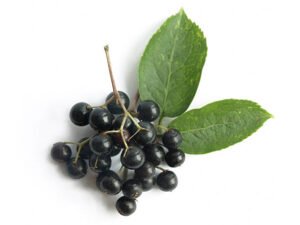 Boosts Immune System
Boosts Immune System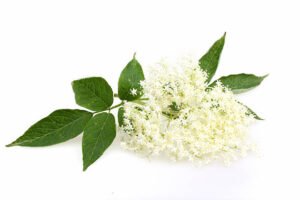 Rich in Antioxidants
Rich in Antioxidants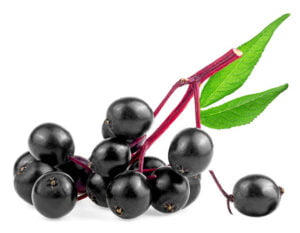 Supports Heart Health
Supports Heart Health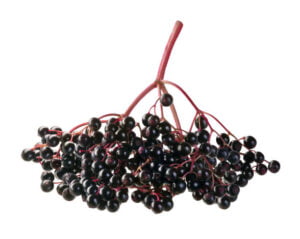 Anti-inflammatory and Anti-viral Properties
Anti-inflammatory and Anti-viral Properties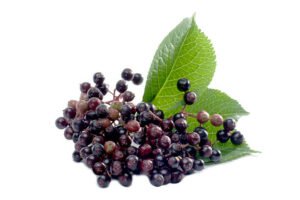 Aids Digestion
Aids Digestion Promotes Healthy Skin
Promotes Healthy Skin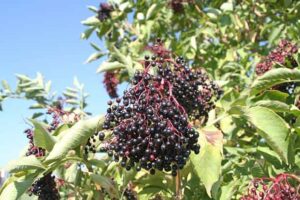 May Help with Weight Management
May Help with Weight Management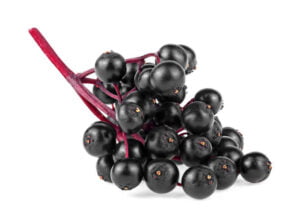 Improves Respiratory Health
Improves Respiratory Health Recipe
Recipe
Super